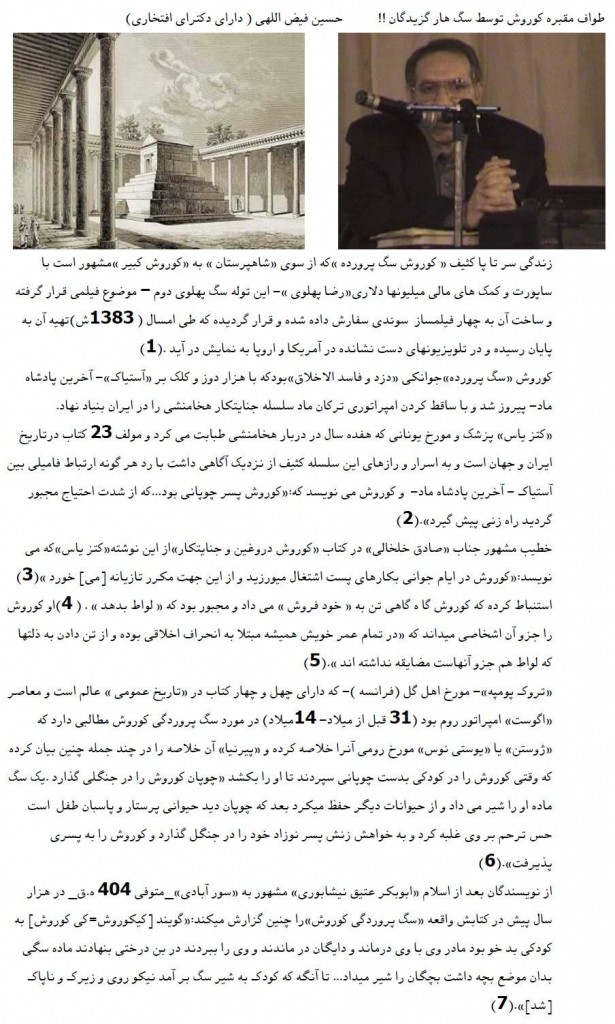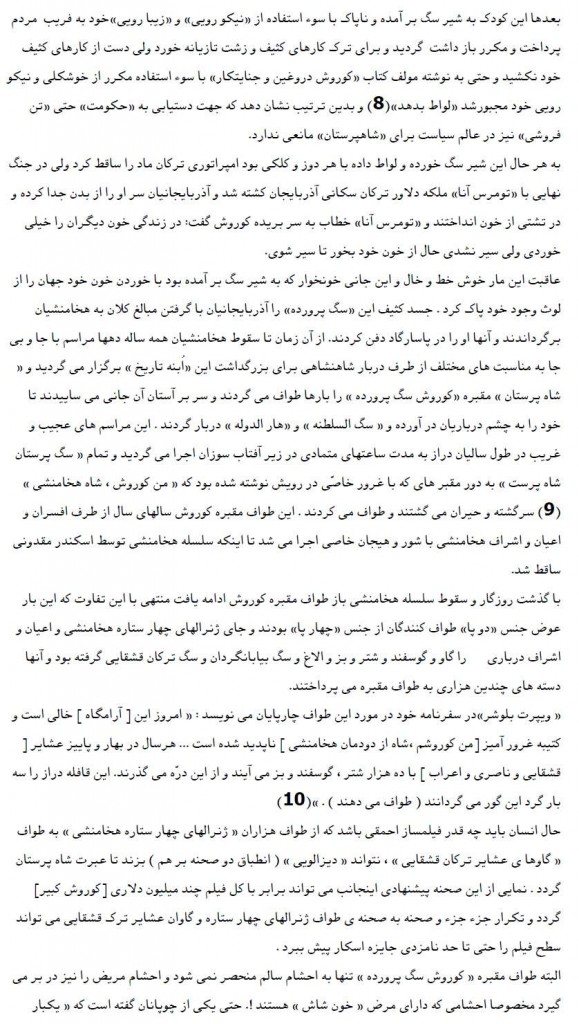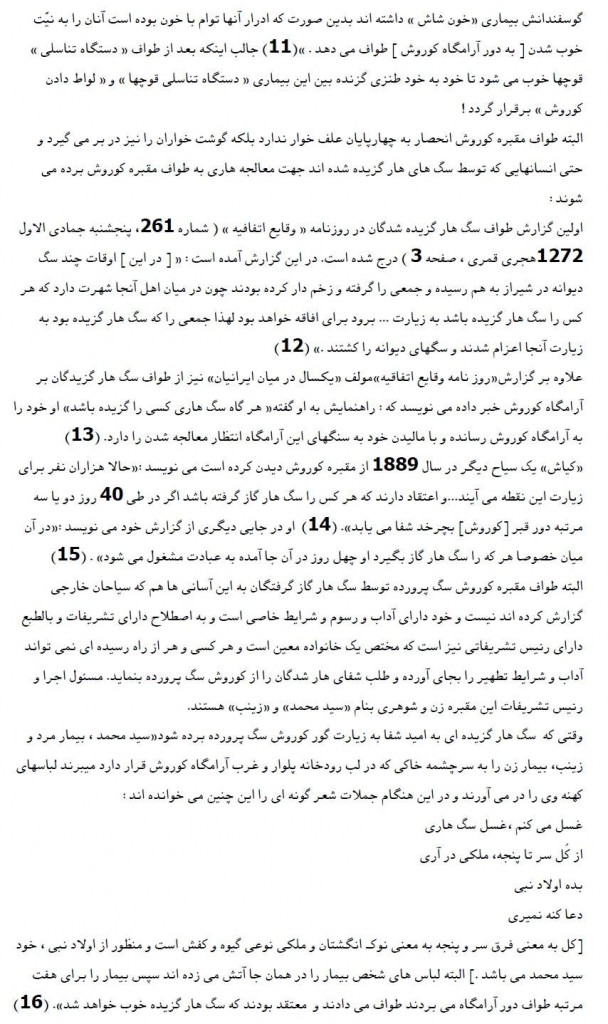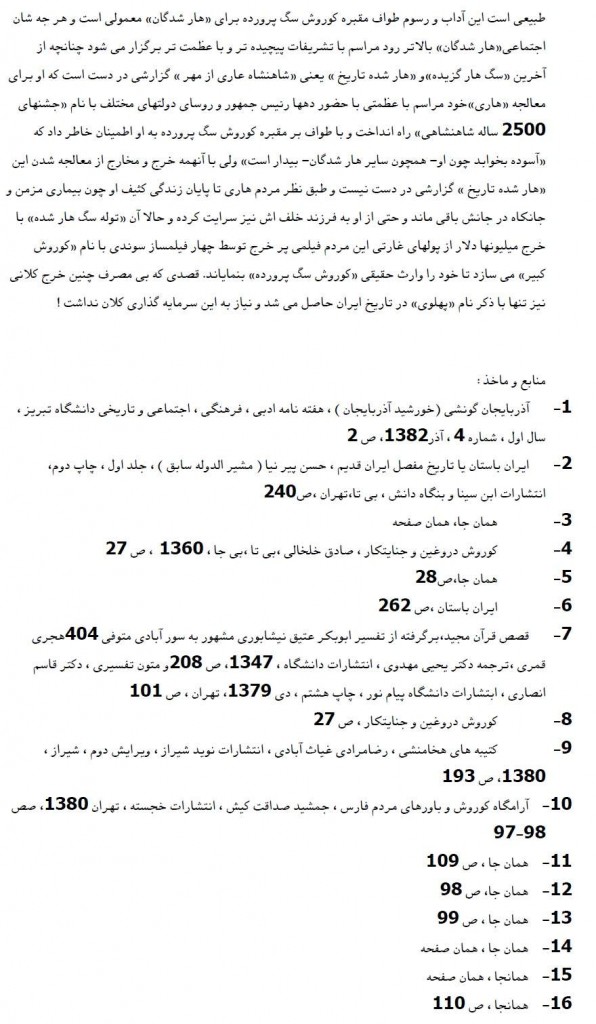Cyrus the Great and the Pan-Turks
Describe the site Zrgshnsp : This article was previously in response to an insulting article by "Hossein Faiz Elahi Vahid".,Pan-Turkish fake doctor and author of the site had been Zrgshnsp the curse of a pan-Turkish writer continues to be published by separatist groups, Main article into a video file from a text file at the end of this article on separatists put.
once again: Kourosh large and پan Trkism
Original Address: Kourosh large and پan Trkism
Authors : Dariush Kiani
Among the men of his time, Koresh was distinguished and excellent in bravery, intelligence and other virtues. // Cyrus was not only a brave man in battle, but he was considerate and kind in dealing with his subjects, and therefore the Persians called him father. (Diodorus Siculus, Kitabhanhi Historical 9/22/1; 9/24/1).
Even to this day, many foreigners in their stories and songs narrate that Koresh was very generous, benevolent, knowledge-seeking, and ambitious, so that he tolerated any hardship and suffering and faced any danger. (Xenophon, fostering Cyrus 1/2/1).
——————————————————————————————
Hossein Faiz Elahi Vahid, a well-known theoretician of the school of forgery, ignorance and deception (Pan-Turkism), who has a special expertise in mythmaking, after vain and unsuccessful attempts to confiscate some of the manifestations of Iranian civilization, such as Rostam, Simorgh (!), Nizami Ganjavi, Abu Reyhan Biruni, Ashkanian and others, in favor of the Turkish people (whose fate and history have nothing to do with Azeri Iranians)In order to fill the void of lack of culture of this nation and compensate for its lack of any prominent historical and literary figure, this time with the understanding that there is no possibility of expropriation and possession of Cyrus the great for the benefit of this nation, with a tone and literature that is in line with their dignity and His co-workers have made Koresh the target of all kinds of obscene insults and insults..
By reading the first lines of the writing that H. Single iceberg God (Has an honorary doctorate from an unknown university in Transcaucasia!) It is interwoven in this regard, it immediately becomes clear that one of the reasons for his hatred and malice towards Cyrus the Great is that the Swedish film industry is planning to make a movie about this world-famous personality, but on the other hand, no one has yet made a movie about famous personalities. Turkish people (We do not know who they are!) He has not made a movie!
ح. فيض الهي وحيد، بنابر شيوهي رايج در ميان همهي پانتركهاي تجزيهطلب، در جاي جاي نوشتهي خود پاي حكومت پهلوي را به ميان آورده و آن را دشنام باران كرده است، بدين منظور كه با سياسي كردن موضوعات تاريخي و فرهنگي و القاي اين تصور كه آگاهيهاي تاريخي كنوني برساختهي پهلويان است، هر كسي را كه به آگاهيهاي تاريخي كنوني باورمند باشد، وابسته و طرفدار حكومت پهلوي جلوه دهند و اورا مرعوب سازند!
ح. In the continuation of his writing, Faiz Elahi Vahid calls Cyrus the Great "a young corrupt thief, a bad-tempered man with bad morals, and a mad dog" and backs it up with arguments - according to his own imagination - that reading them only makes people feel pity and pity for their spiritual and intellectual condition. H. God's grace inspires Vahid.
At the beginning, he claims that Ctesias, a Greek writer, introduced Cyrus in this way, but in practice it turns out that he is neither familiar with that Greek writer nor has he read his writings, but that his source is a writing by Sheikh Sadegh Khalkhali - I don't know why they called him a famous orator despite the fact that everyone knows him as the first ruler of the Islamic Revolution.! In his writing, the mentioned sheikh wanted to fight with the Pahlavi government, seeking to distort the image of Cyrus the Great; However, in order to understand the level of understanding and knowledge of the mentioned sheikh from historical texts, it is enough to point out that he used the word "bandit", which is written in the book of Ravanshad Hassan Pirinya, quoted by Ketzias and about the father of Kurosh Kabir. "Woman's Way" (= feminine style) He read it and attached it to Cyrus the Great, inferring that he is morally corrupt; And now, the author of Pan-Turk Kejfahmane has made the basis of his insults against Cyrus the Great.!
But by referring to what remains of the writings of Cetzias (1) It is clear that he did not say anything about the moral situation and the youth of Cyrus. But Niklas Damaschi, the writer of the Hellenistic era, has narrated a legend in his writings, in which it is said that Cyrus was the son of a man who was a bandit due to poverty, and a woman whose job was shepherding. (2). Assuming the truth of this story (which is not possible)It should be said that having a family from an inferior and poor class does not cause humiliation and humiliation for anyone, and if a person from such a position has reached the position of fulfilling the greatest empire of the ancient world, he should be continuously praised and considered an unparalleled genius.. But this is not the only issue.
Niklas Damaschi further narrates that Cyrus was a beautician when he was young (Flowering and gardening) He was engaged in government real estate, and then he was assigned to the job of a butler to Astyages, the king of the Medes. But the interesting point here is that the same story is also told about Sargon, the ancient king of Akkad.. In this story, it is said that Sargen's mother was a priest and his father lived in the mountains (راهزن بود). The mother put the baby in a basket and left it in the river. A man fetching water from the river took him and raised him. Sargen was engaged in gardening in his youth, and then he engaged in gardening in the king's office of Akkad (3). Similar to this story, in Iran's national epic, about Ki Qabad and Darab (4) It has also been narrated. But we know that Sargen was from a royal family and what about his lowly origin (And people like Cyrus and Ki Qabad and …) It has been recounted, there is a mythic basis in the statement that the king in question has reached the kingdom due to his individual merit and merit, and the choice and support of the gods, and without a fight and struggle, and therefore his rule is legitimate and rightful in every respect. Is. About Cyrus the Great, it is also certain that he is from the dynasty of their kings (The eastern part of the land of Ilam, Pars/Next Fars) بوده (Xenophon 1/2/1; 7/2/24; Babylonian cylinder of Cyrus 12; Measure with both of them 1/107; 7/11), and it is clear that the story that was told about his rise from a lowly origin was nothing but a retelling of an ancient myth and tradition to strengthen the legitimacy and righteousness of Cyrus the Great's kingdom.. Of course, from the ignorance of H. One should not be surprised by Faiz Elahi Vahid's historical documents and his inability to understand mythological themes, because Pan-Turkism theorists' unceasing preoccupation with distorting and confiscating Iran's history does not give them the opportunity to acquire knowledge and literacy. Although their nature is not receptive to any kind of education!
ح. Faiz Elahi Vahid continued his writing, by misusing the story of Yustin (Excerpt from the history of Philippi 1/4), the Greek historian, has quoted, calls Cyrus the Great "a dog breeder" and then concludes that Cyrus lived a "dirty life".! A story told by Justin, which is a continuation of the same myth told by Nicholas of Damascus, describes that Astyages had a dream that meant his overthrow by his grandson.. Therefore, he ordered his grandson, Cyrus, to be killed. But the official did not do so and left Cyrus in the forest. There, a female dog nursed the baby Cyrus and took care of him until a shepherd took him to him and raised him.. But this story also has a mythological theme that has been narrated about other characters. As it is said in Roman legends, Remulus and Remus (Later founders of Rome) He was put in a basket as a baby and left to flow in the river. On the bank of the river, a she-wolf nursed them and took care of them until a shepherd found them and raised them. (5). Moreover, it is even said about Zoroaster that he was nursed by a sheep when he was left in the forest. (Dencred 7/3/17). And the story of raising Zal by Simorgh is also a very famous story. This myth, in line with the same myth that attributes the king to an inferior class, refers to the fact that God's special protections were released from the soul of a child, who is destined to grow up in the future to obey, such that even an animal (such as dogs, wolves, simorgh, etc…) Contrary to his nature and only because of a divine miracle, he is assigned to raise and take care of the human baby.
The H. Faiz Elahi Vahid, who, like every other deceitful and deceived Pan-Turk, has accumulated ignorance and naivety in every bit of his being, considered this specific myth to be a fact and considered it a historical report.. He does not understand the difference between myth and history, nor does he know that it is not possible to feed humans from dog's milk..
Bari, except for the legendary story of Nicholas of Damascus, all the ancient historians, in line with the historical documents of that time, state the noble and royal lineage of Cyrus, his dignified and royal upbringing, and his humane and moral character and method, and therefore this claim is valid.. God's grace alone :"In addition to emphasizing Cyrus's immorality, historians other than Cetzias who lived before Christ have revealed another part of the secrets of his dirty life", a dirty forgery and distortion is one of the shameful lies of the Pan-Turks..
But the point that is hard to expand the mind is that Faiz Elahi Vahid attributes to Cyrus a "dog rearing" and dirtiness that the Turks, with complete belief and pride, consider themselves to be descended from a wolf.! It is natural that from the eyes of the students of the school of forgery, ignorance and deception (Pan-Turkism)A bloodthirsty wolf has honor and superiority over a loyal dog!
ح. Faiz Elahi Vahid, in the continuation of his dog-playing story, makes and writes a new claim, for which he does not introduce any source, and it is evident that the source of it is his own corrupt imagination.: "Iskander was told that because the foundation of the Achaemenid dynasty was built with "dog lions" and the "protectors" of this family are "dogs", so wherever you see a dog roaming on top of a dead body, know that the body belongs to the Achaemenid king, and thus the Greeks will soon With the same symptoms, they found the body of Darius III of Achaemenid and brought it to Alexander.! The products of the Pan-Turks factory of forgery and lies, which fueled it 75 America's million dollars and its workers and staff are a bunch of deceived and mentally deficient people, it is not enough..
ح. Faiz Elahi Vahid writes in another place of his article: "In any case, what emerges from the Greek and Islamic interpretations is that Cyrus was a so-called big dog breeder with every dose and skill, he destroyed the empire of the Median Turks and Astyaks killed the last Median king in exile.". From this statement, the reader understands well that another reason for the hatred and hostility of the Pan-Turks towards Cyrus the Great is that he ruled - according to them – "Trek" has raised the females!
It should also be emphasized that the Islamic sources had no information about the Medes or anyone named Astyages, and that there is no evidence that the last king of the Medes was killed by the order of Cyrus the Great. (On the contrary, Nak. to both of you 1/130 which says that Astyages will live in peace and security until the end of his life, and Justin 1/6 which informs about the assignment of Astyag to Gorgan Municipality)I must state again that so far no written documents of paper, leather or stone have been found to show that the people of northwestern Iran spoke Turkish before the rule of the Turkomans-Safavians.. Rather, all the existing historical, archeological and linguistic documents testify unanimously that the Medes and their successors in the Islamic era were Iranian in origin, culture and language. (6). We should also add that the Persians and the Medes had such close ethnic and cultural ties that the ancient writers called the Persians the Medes many times. (nick. Herdot 1/206; 4/197; 6/64 112 Etc; Diogenes Laertius 2/5; Diodros 9/31; Plutarch, Themistocles 8/6; And…).
اينك آشكار است كه هر نوع تكاپويي در جهت ترك جلوه دادن دودمانها و شخصيتهاي ايراني يا مخدوش كردن چهرهي شخصيتهاي تُرك نشدني، از طريق جعل و تحريف و دروغ و فريب، اقدامي محكوم به شكست و مشتي است كه پيوسته به سندان كوفته ميشود و نتيجهي آن، فروپاشي و خُرد شدن كامل موجوديت اشرار تجزيه طلب پانترك است، كه اين روزها خصلت خرابكاري و آشوبطلبي و تجاوزگري خود به جان و مال مردم را به خوبي برملا و آشكار كردهاند.
——————————————————————————————————-
The worst of animals with God are the deaf and dumb who do not understand (Surah Anfal: 22)
Indeed, the most evil creatures in the eyes of God are those who (relative to the facts) They are deaf and dumb and never reason.
——————————————————————————————————-
Footnotes
1.
http://www.tertullian.org/fathers/photius_03bibliotheca.htm#72
2.
R. Drews, “Sargon, Cyrus and Mesopotamian Folk History”, Jouranl of near eastern studies, flight. 33, No. 4, 1974, pp. 389-391
3.
There
4.
حماسهسرايي در ايران، ذبيح الله صفا، انتشارات فردوس، 1374، ص 481، 42-541
5.
http://www.bartleby.com/65/ro/Romulus.html
6.http://prana.persianblog.com/1382_7_prana_archive.html#938324
——————————————————————————————————-















A reflection on the article, and Cyrus Dhul-Turkism
turks.parsiblog.com/Posts/278/تاملي+بر+مقاله+كورش+ذوالقرنين+و+پانتركيسم/
[…] Death note the number nine, Fhshnamh the Achaemenid Cyrus at the end of this look(The sample in this article and other articles still on […]
درود بر كوروش بزرگ …
A bad gem if the golden cup breaks
The price of stone will not increase and gold will not decrease
درود بر كوروش بزرگ …